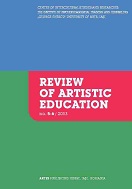THE CONCEPT OF HERMENEUTICS IN MUSIC EDUCATION: A COMPARATIVE STUDY FROM KRETZSCHMAR TO KABALEVSKY
THE CONCEPT OF HERMENEUTICS IN MUSIC EDUCATION: A COMPARATIVE STUDY FROM KRETZSCHMAR TO KABALEVSKY
Author(s): Margarita TeteleaSubject(s): Music
Published by: Editura ARTES
Keywords: musical hermeneutics; comparative study; Herman Kretzschmar; Dmitry Kabalevsky; music education; musical image; musical discourse.
Summary/Abstract: The XXI century is considered to be the century of interpretation and spiritual ascendence of the personality. In this context we also involve the role of music education, in which hermeneutics enables the opportunity to make discoveries, to understand the human mind and soul. In this connection the basic principle is to establish the dialog between past and present. Music-hermeneutical interpretation is the key to understanding the inner world and the general spiritual values of the pupil. It is also seen as the most individual and personal interpretation. Only in this way, the pupil-listener can rediscover himself in music, making a decisive role in the reconstruction of musical image. The hermeneutical interpretation of the musical image requires not only pupil’s intellectual background knowledge, but also emotional, and psychological attitude. Thus, it contributes to the creation of a beautiful soul, and as follows the creation of true aesthetic values. Hermann Kretzschmar (Germany) and Dmitry Kabalevsky (Russia) touch upon these issues in their works. The comparative approach to the concepts of music education of these great personalities gives us the opportunity to see that two systems, one created in Germany in the early XX century and the other in Russia at the late XX century, hold the idea of a hermeneutic dimenssion as a process that establishes a relationship between pupil and music. Given the numerous works of these great teachers and musicians, we note that in order to access the hermeneutical interpretation of musical discourse, pupils need a creative and artistic involvement besides musical knowledge. Thus, hermeneutical interpretation becomes interdisciplinary. In this context, music will be regarded from different aspects, such as: historical, musicological, artistic and aesthetic aspects. This kind of interpretation – recreation of music contributes to pupil’s musical and spiritual culture formation and development.
Journal: Review of Artistic Education
- Issue Year: 2013
- Issue No: 05+06
- Page Range: 6-11
- Page Count: 6
- Language: English
- Content File-PDF

